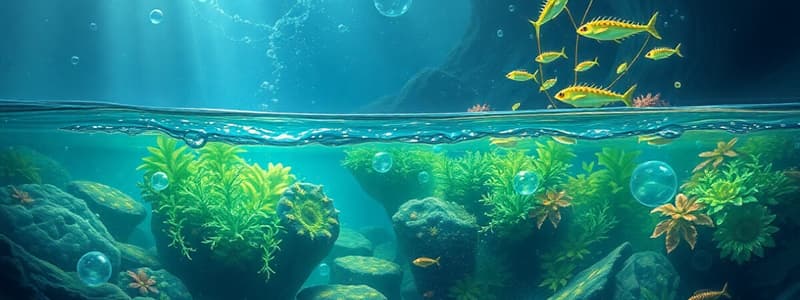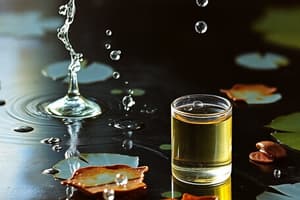Podcast
Questions and Answers
What allows water molecules to form hydrogen bonds with each other?
What allows water molecules to form hydrogen bonds with each other?
- Chemical reactions
- High temperature
- Their nonpolar nature
- Polarity (correct)
What percentage of water do organisms typically contain?
What percentage of water do organisms typically contain?
70–90%
What are the products of pure water ionization?
What are the products of pure water ionization?
H+ and OH-
Water is not a good solvent for charged and polar substances.
Water is not a good solvent for charged and polar substances.
Which of these interactions contributes to the unique properties of water?
Which of these interactions contributes to the unique properties of water?
Nonpolar molecules are easily soluble in water.
Nonpolar molecules are easily soluble in water.
What type of bonding allows water to serve as both a hydrogen bond donor and acceptor?
What type of bonding allows water to serve as both a hydrogen bond donor and acceptor?
Water is a __________ solvent for charged and polar substances.
Water is a __________ solvent for charged and polar substances.
What feature of the water molecule contributes to its high boiling and melting points?
What feature of the water molecule contributes to its high boiling and melting points?
Flashcards are hidden until you start studying
Study Notes
Importance of Water
- Comprises 70-90% of organisms, essential for nutrient dissolution and transportation.
- Facilitates chemical reactions in an aqueous environment.
- Critical for protein, nucleic acid, and membrane structure and function.
Structure of Water
- Composed of one oxygen atom and two hydrogen atoms.
- Oxygen has four electron pairs: two involved in covalent bonds with hydrogen, two as lone pairs.
- Water is a polar molecule, with opposite charges at each end.
- Electronegativity of oxygen creates a net dipole moment, enhancing hydrogen bonding capabilities.
Hydrogen Bonding
- Strong interactions occur between electronegative atoms (commonly nitrogen and oxygen).
- Hydrogen bonds are strongest when molecules are aligned linearly.
- Hydrogen can act as both a donor and acceptor, enabling extensive bonding (up to four per molecule).
Unique Properties of Water
- Exhibits remarkably high boiling and melting points due to hydrogen bonding.
- Demonstrates large surface tension resulting from cooperative hydrogen bonding.
- Hydrogen bonds are weaker than covalent bonds but accumulate to affect water's behavior significantly.
Water and Polar Solutes
- Water forms hydrogen bonds with polar substances, enhancing solubility.
- Polar solutes, including amino acids, small alcohols, and carbohydrates, replace water-water interactions with more favorable water-solute interactions.
Solubility Characteristics
- Hydrophilic substances dissolve readily in water due to favorable interactions.
- Hydrophobic substances poorly dissolve and tend to cluster, as they disrupt water-water interactions without forming significant water-solute interactions.
Ionization of Water
- Water can ionize into protons (H+) and hydroxide ions (OH–), a rapid reversible process.
- Most water molecules remain un-ionized, resulting in very low electrical conductivity.
- Water plays a role in biochemical processes including hydrolysis, condensation, and oxidation-reduction reactions.
Buffers and pH
- Buffers manage pH by minimizing changes in H+ concentration.
- Understanding dissociation constants of weak acids and bases is essential for comprehending buffering systems and pH scale.
Studying That Suits You
Use AI to generate personalized quizzes and flashcards to suit your learning preferences.




